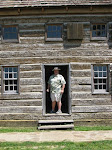 There was a time when I didn't think much of what people today call flyover country, the vast American experience between the Eastern Seaboard states and the West Coast. It's never been an active dislike for that territory on my part, but more like a subject lost to other interests. If anything, the story should have been different long before I married into a Midwest and Great Plains family in 1981. As a historian and geographer, I was immersed in Frederick Jackson Turner's frontier hypothesis and its iterations by Ray Allen Billington, and a host of professors schooled at the history department Turner made famous at the University of Wisconsin. A decade after formal education ended, a new learning began as I made frequent and extended trips into that region to meet my new family and know the American interior they called home.
There was a time when I didn't think much of what people today call flyover country, the vast American experience between the Eastern Seaboard states and the West Coast. It's never been an active dislike for that territory on my part, but more like a subject lost to other interests. If anything, the story should have been different long before I married into a Midwest and Great Plains family in 1981. As a historian and geographer, I was immersed in Frederick Jackson Turner's frontier hypothesis and its iterations by Ray Allen Billington, and a host of professors schooled at the history department Turner made famous at the University of Wisconsin. A decade after formal education ended, a new learning began as I made frequent and extended trips into that region to meet my new family and know the American interior they called home.We could debate endlessly about the merits of the work by Turner and his students, but there is no question that the evolution of settlement in the Heartland has stamped it with a distinctive personality. In his new book, Prairie Republic: The Political Culture of Dakota Territory, 1879-1889, Jon Lauck explores a surprising aspect of that personality that flourished in one part of the inland nation. It is all about republicanism and the English legal system that a century earlier bound the colonies in a new venture called the United States of America. It is about a civic society rivaling and often exceeding that found in many of the much older Eastern states. Today, the cultural remnants of that period make for interesting politics in the Age of Obama.
Travis Kavulla reviewed this book in the August 3 issue of National Review. Unfortunately, the review is available only through purchase - online at www.nationalreview.com - or your local library. I'm happy to report there is an excerpt available at NRO's The Corner, along with some comment, thanks to a post by Denis Boyles.
I have a feeling this is going to be an important book in spite of what may appear to be a rather dreary and esoteric subject.
Travis Kavulla reviewed this book in the August 3 issue of National Review. Unfortunately, the review is available only through purchase - online at www.nationalreview.com - or your local library. I'm happy to report there is an excerpt available at NRO's The Corner, along with some comment, thanks to a post by Denis Boyles.
I have a feeling this is going to be an important book in spite of what may appear to be a rather dreary and esoteric subject.

No comments:
Post a Comment